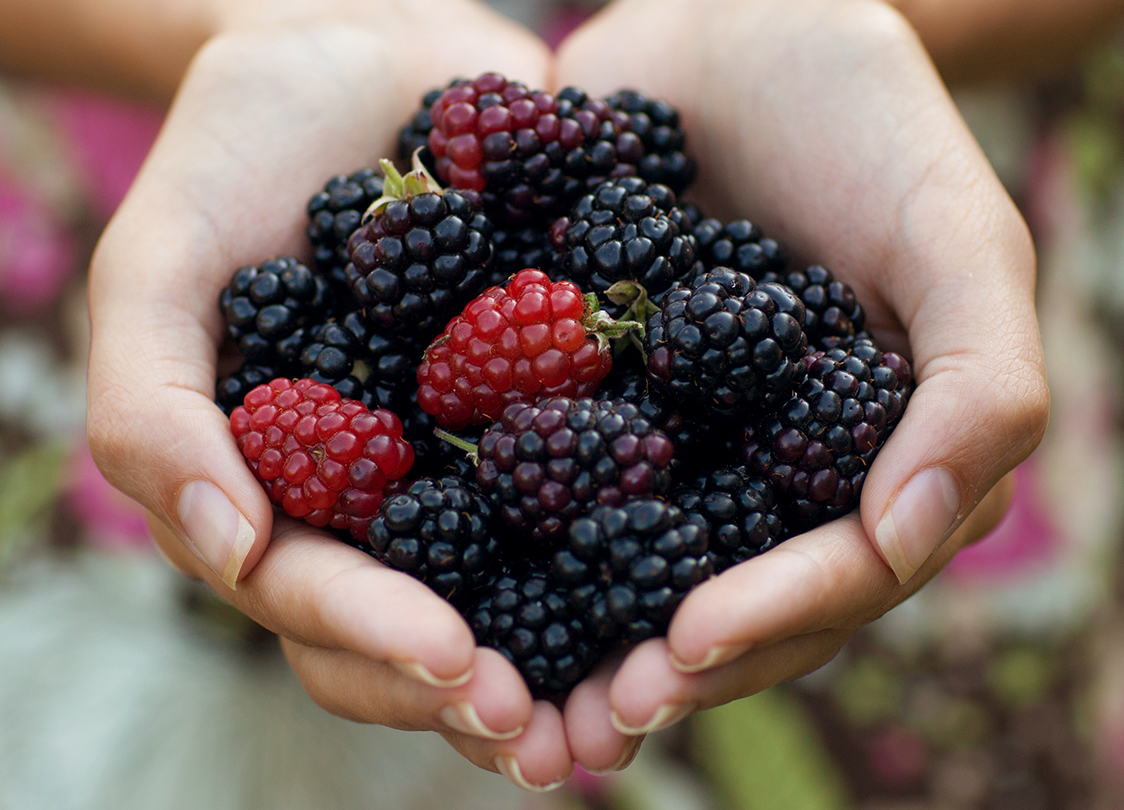By Alethia Russell
June and July are prime picking season for a fruit that’s rooted in our Alabama hearts: the blackberry.
Although the origins of the blackberry are unknown, it is believed it originated in Asia, Europe or North or South America. Most of the berries we consume in the Southeast are grown from a breeding program based at the University of Arkansas and other universities in the Southeast. Once these seedlings go public, nurseries and home gardeners can take up the hobby of raising these beauties to their peak.
Blackberries are not widely grown in the state, but Alabama’s legislature declared the blackberry as the state fruit in 2004, at the request of Fairhope Elementary School faculty and students. Teachers Susan Sims and Amy Jones noticed Alabama laid no claim to a fruit of its own like our neighboring states, and set out to fix that. They researched the fruit and received the backing of then-Sen. Bradley Byrne and State Rep. Randy Davis to help push it through the Senate. (Alabama’s official tree fruit is the peach, recognized as such in 1949.)
The good news is that you can grow them yourself in your backyard garden. The health and wellness benefits blackberries provide are more than enough incentive to invest. Blackberries are low in sodium and calories, and are rich in bioflavonoids and Vitamin C. The dark color of the fruit indicates it has one of the highest levels of antioxidants in fruit. Tea drinkers use the leaves of the fruit for added flavor or as a therapeutic drink. Just mask the bitterness with a little honey and sip away. The leaves have also been used to treat gum inflammation.
The plant has proven to be a low maintenance and attractive addition to vegetable gardens, according to Jason Powell, co-owner of Petals from the Past Nursery in Jemison.
“You can grow blackberries without a lot of fuss,” Powell says. “So we have a lot of home gardeners who like to grow them in their gardens because you don’t have to deal with a lot of spray programs. If you can give them sunshine, and plant a good variety and fertilize twice a year, you’re good.”
Blackberries should be planted in early spring, preferably one month to one month and a half before the last frost of the winter. It prefers acidic or neutral soil for growing. Soil pH should range from 5.5 – 7.0. Pests can build up in soil over the years, so avoid planting blackberries in an area where other brambles have grown to prevent contaminating the plant. These plants will not produce fruit the first year, but with proper maintenance they will produce fruit the following year. Gardeners should fertilize as early as possible in the spring and maintain the bushes with trellises. With proper growing supervision, a blackberry bush can last anywhere from 15-20 years.
Here are a few tips for growing blackberries at home:
Blackberries are self-fruitful: This means you can plant one variety of blackberry and there’s no need for another plant for cross-pollination.
Fertilizer is important: Blackberries need proper soil nutrients to grow. Alabama soil typically cannot provide these nutrients on its own. Proper fertilizing and maintaining mulch around the base of the plant will keep weeds and grass from sapping nutrients from your berries. Also avoid planting in sandy or heavy clay soil.
Walking on sunshine: Blackberries require a minimum of five hours of sunshine per day. Water them once or twice a week as needed to maintain moisture and sun balance. Be sure to give them at least an inch of water in drier periods.
Growing Room: The easiest way to grow blackberries at home is in a standard 10-foot row with a trellis. Blackberry bushes are naturally climbing plants.
Know what you grow: Blackberries are also referred to as caneberries, bramble, brambleberries, etc., because they grow in thorny and thornless varieties. But they are also classified by what type of bearing they produce. Primocane bearing varieties grow the canes and fruits on the same cane during the same year. Jim Pitts, director of Chilton County Research and Extension Center, suggests that the Natchez variety is the best non-thorny variety suitable for home gardening. Visit your local hardware store or nurseryman and ask about the variety best for your gardening needs.
After all your hard work, you can enjoy the fruits of your labor. When your berries begin to ripen, try to pick them every three to six days and enjoy them alone or in pies, jams or jellies. If not, the birds will have fun eating your berries.
Alethia Russell, a senior at Auburn University, is a summer intern for Alabama Living.
Magic Blackberry Cobbler
1 stick butter
1 cup self-rising flour
1 cup sugar
3/4 cup milk
1 quart blackberries
3/4 cup sugar
Preheat oven to 375 degrees. In a 2 quart baking dish melt butter in oven. Remove from oven. In a separate bowl mix flour and 1 cup sugar until well blended. Add milk and mix until blended. Pour this mixture over butter but DO NOT STIR. Pour blackberries over this mixture but DO NOT STIR. Sprinkle 3/4 cup sugar over berries but DO NOT STIR. Bake, uncovered, for 45 to 50 minutes. It should be brown when done. Serve warm.
Kimberly Baugh, North Alabama EC
From the Alabama Living recipe archives. See more recipes here.





